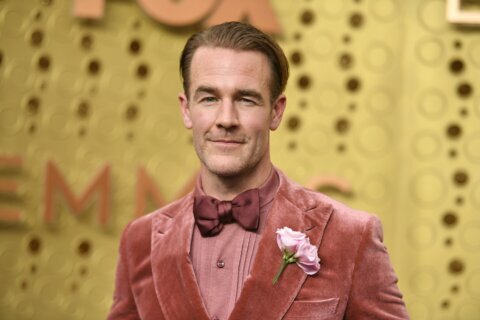WASHINGTON — This week’s Golden Globes urged female empowerment amid Hollywood sex scandals. But immediately after Oprah’s rousing speech, Natalie Portman exposed a rather embarrassing irony when presenting Best Director: “Here are the all-male nominees.”
Three years after Ava DuVernay was snubbed for “Selma” (2014), it’s still a question worth asking: Why are there no women nominees in such a banner year for female filmmakers?
This isn’t some token nod to appease a political zeitgeist. These are worthy candidates that deserve recognition in any year — and especially during this tipping point of social change.
On Thursday, the Directors Guild of America has a chance to address the issue when it announces its nominees for the DGA Awards, which could ultimately influence the Oscars.
Here are five potential female nominees to be considered for the five slots of Best Director:
Sofia Coppola
In May, Sofia Coppola won Best Director at the Cannes Film Festival for “The Beguiled,” yet wasn’t even nominated for a Golden Globe by the Hollywood Foreign Press Association.
That’s unfortunate, considering a Cannes directing win often propels American directors to Oscar or Globe nods: Terrence Malick’s “Days of Heaven” (1978), Robert Atlman’s “The Player” (1992), the Coen Brothers’ “Fargo” (1996), David Lynch’s “Mulholland Drive” (2001), Julian Schnabel’s “The Diving Bell and the Butterfly” (2007) and Bennett Miller’s “Foxcatcher” (2014).
The film showcased Coppola’s ability to build slow-burn tension and moody atmospherics, using subtle glances between Nicole Kidman, Kirsten Dunst and Elle Fanning, who treat a wounded Union soldier (Colin Farrell) at their all-girls school in Virginia during the Civil War.
Here’s hoping Coppola receives serious consideration at the DGA Awards and the Oscars.
Patty Jenkins
In June, Patty Jenkins won the box office with the superhero blockbuster “Wonder Woman,” which was the highest-grossing movie of the summer and the third highest of the entire year.
To paraphrase Samuel Beckett’s “Waiting for Godot,” actress Gal Gadot was figuratively the “gal we’ve been waiting for,” combining her dual backgrounds as a Miss Israel pageant champ and an Israeli Army combat instructor to create a unique heroine that was beautifully badass.
The film showcased Jenkins’ ability to craft brilliant action sequences that resemble moving panels of a comic book, using slow motion just before delivering a blow, then ramping back up to normal speed. I defy anyone to find a better action scene this year than the opening battle on the beaches of Themyscira or the pivotal scene in the trenches of World War I, where Diana crosses “No Man’s Land,” deflecting bullets and providing cover with her shield.
Here’s hoping Jenkins receives serious consideration at the DGA Awards and the Oscars.
Kathryn Bigelow
In August, Kathryn Bigelow delivered a gritty social drama in “Detroit,” her latest after “The Hurt Locker” (2009), which made her the first woman ever to win the Oscar for Best Director, and “Zero Dark Thirty” (2012), which earned her a second Globe nomination for Best Director.
Rather than foreign war zones, this time Bigelow reunited with screenwriter Mark Boal to explore the domestic war zones of our own inner cities, particularly a real-life case of police brutality that unfolded at the Algiers Motel during the Detroit race riots of July 23, 1967.
The film showcased Bigelow’s ability to seamlessly blend documentary footage with narrative filmmaking, using the same cinema verite style that Italian neorealists used to avoid detection by the Germans in Roberto Rossellini’s “Rome, Open City” (1945). Granted, the better analogy is Gillo Pontecorvo‘s “Battle of Algiers” (1966), for its shared namesake of the Algiers Motel.
Here’s hoping Bigelow receives serious consideration at the DGA Awards and the Oscars.
Greta Gerwig
In November, Greta Gerwig created a coming-of-age masterpiece in “Lady Bird,” her solo directorial debut after penning and starring in Noah Baumbach’s “Frances Ha” (2012) and “Mistress America” (2015). It may be the best film to capture the Millennial experience.
Set in her native Sacramento in 2002, the film follows a rebellious teenager who navigates sex, religion and Recession-era economics while attending a Catholic high school, dating a range of theater geeks and emo rockers, and clashing with her condescending mother.
The film showcased Gerwig’s ability to coach authentic mother-daughter performances, using unique frames against suburban backdrops, from painted walls to picket-fence houses. The film won Golden Globes for Best Picture: Comedy/Musical and Best Actress: Comedy/Musical for Saoirse Ronan, yet somehow, the director of that same movie wasn’t even nominated.
Here’s hoping Gerwig receives serious consideration at the DGA Awards and the Oscars.
Dee Rees
Finally, and most deserving of all, is director Dee Rees, who turned her NYU thesis film into the Sundance breakthrough “Pariah” (2011) before giving us “Mudbound.” Sadly, few folks saw it due to its straight-to-Netflix release the same day as its limited run in select indie theaters.
Set in 1940s Mississippi, the fatalistic story follows both poor white farmers and black share croppers, who send their respective family members to fight together in World War II, forming a colorblind bond that’s not reciprocated when they return home to Jim Crow segregation.
The film showcased Rees’ ability to paint an epic canvas, using stacked profiles for gorgeous compositions and symbolic blocking to express character relationships, as Jason Mitchell and Garret Hedlund move closer in the barn as they bond. It’s a throwback presentation that begs to be seen on the big screen like the classics of George Stevens, John Ford and William Wyler.
Here’s hoping Rees receives serious consideration at the DGA Awards and the Oscars.
In the end, it’s very hard to land a directing nomination — as it should be. That’s especially true when it’s a packed category with the likes of Guillermo del Toro (“The Shape of Water”), Christopher Nolan (“Dunkirk”), Martin McDonagh (“Three Billboards Outside Ebbing, Missouri”), Steven Spielberg (“The Post”) and Ridley Scott (“All the Money in the World”).
Still, it’s troubling to see voters overlook so many qualified female directors in order to reward Scott for reshooting a movie to remove Kevin Spacey over allegations of sexual misconduct. Mark Wahlberg was reportedly paid $1.5 million for the reshoot, while Michelle Williams was paid an $80 per diem totaling less than $1,000. Yes, Williams has twice the number of Oscar nominations as Wahlberg, yet she made peanuts while he made all the money in the world.
Pay disparity aside, the female films were also more acclaimed. On Rotten Tomatoes, “Lady Bird” (99 percent), “Mudbound” (96 percent), “Wonder Woman” (92 percent), “Detroit” (84 percent) and “The Beguiled” (78 percent) ranked higher than “All the Money in the World” (76 percent). As for box office, “Wonder Woman” ranked No. 3 ($412 million) and “Lady Bird” ranked No. 68 ($34 million), compared to “All the Money in the World” at No. 99 ($20 million).
What message does this discrepancy send? That Hollywood patriarchy is alive and well.
Here’s hoping this embarrassment is corrected when the DGA Awards announce their nominees on Thursday and the Academy Awards announce their nominees on Jan. 23.
It’s nice that Hollywood is finally talking the talk, but it’s time to start walking the walk to ensure that another actress doesn’t have to spit the irony, “Here are the all-male nominees.”








